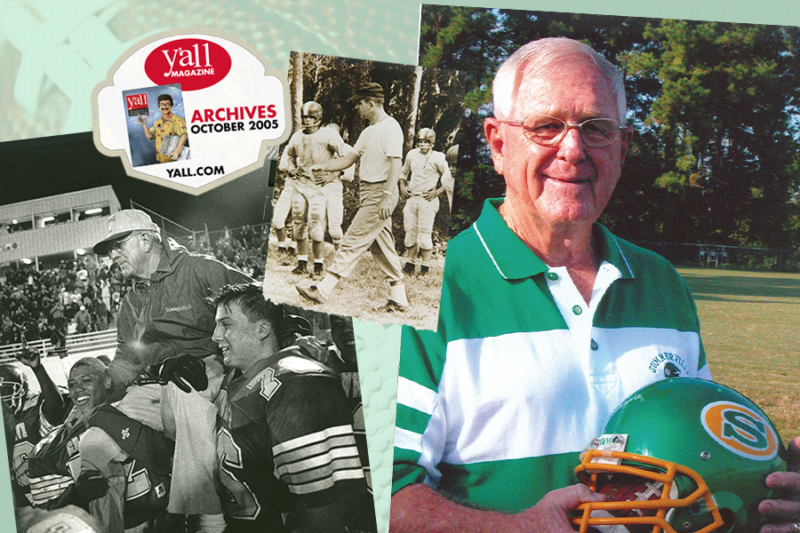The winningest football coach at any level died Thanksgiving Day at the age of 93. John McKissick garnered 621 wins coaching high school football in South Carolina. This feature was originally published in the October 2005 issue of Y’all Magazine. Story by Jeffrey Rhea Mitchell.
John McKissick: America’s Winningest Football Coach
America in 1952 was a nation poised for economic boom times as the country was shaking off the residual dust of the Great Depression. World War II had its own chapter in the history books, and while the Cold War had everyone on edge, technology was coming of age, injecting the American people with a healthy dose of American hope. President Harry Truman was serving his last year in the White House. Nat King Cole’s “Unforgettable” ascended to the top of the pop charts. Hard work and dedication were the nation’s watchwords, and John McKissick, a 25-year-old football coach from South Carolina, was laying the groundwork for his legendary career.
In football, being designated a legend is usually based on the magnitude of a player’s statistics. Quarterbacks achieve such notoriety by accumulating touchdown passes. Running backs receive kudos based on total yards rushed. Kickers gain fame by consistently booting field goals, especially last second tries that turn spectators into frenzied fanatics. Coaches, however, reach legendary status not by yards gained or points scored, but by games won.
In the case of Summerville High School football coach John McKissick, the term legend falls ingloriously shy of describing the nation’s all-time winningest football coach at any level: high school, college, or professional. Super-legend, if such a moniker exists, would be more suitable. The 2005 season will mark McKissick’s 54th year as the sideline boss for the mighty Green Wave of Summerville, South Carolina (pop. 27,752). At 79, McKissick boasts a career record of 520-124-13, which equates to an eye-popping .791 winning percentage. Enduring only two losing seasons in his 53 year tenure (1957 and 2001), McKissick has guided his teams to ten state championships and seven undefeated seasons.
It is no wonder then that in Summerville, Coach McKissick’s name is synonymous with winning. Since 1952, winning is all Coach McKissick has done, and his drive for success is directly derived from the culture of the day when he began his illustrious career.
McKissick’s passion for victory emerged from the bleakness of an impoverished childhood during the Great Depression in the quaint Lowcountry town of Kingstree, S.C. (pop. 3,496).
“Growing up poor gave me drive,” McKissick says. “I put pressure on myself to try to achieve something in life. I’ve had empathy for kids who had a tough time, especially if they were trying, and compassion for those who lacked confidence.”
McKissick’s love for football began when he played midget football in the eighth grade. From midget football, McKissick advanced to play prep football at Kingstree High for four years.
Following high school, McKissick served in World War II in the United States Army in the 82nd Airborne Division, before going to college. After graduating in 1951 from Presbyterian College in Clinton, S.C., where he wrestled and played football and baseball, McKissick landed a job in Clarkton, N.C. — over the phone, sight unseen. It wasn’t until he arrived on campus that he discovered that he would be coaching six-man football while earning an annual salary of $2,700 a year. McKissick called Lonnie MacMillian, his coach at Presbyterian and a pioneer of the Split-T offense, for advice.
“He gave me four plays to run — told me to run them to the right and left, so it would seem like I had eight,” says McKissick, whose team went 7-0 in 1951. (None of those victories are included in his 520 wins.)
Relishing an eleven man challenge, McKissick applied for the job at Summerville in the spring of 1952.
“The superintendent, Frank Kirk, later told me I got the job because I was the only applicant who didn’t ask how much it paid,” says McKissick.
In addition to coaching football in that first season at Summerville, where he recorded an 8-1-2 mark, McKissick coached boys and girls basketball, baseball and track. He taught two South Carolina history classes and three U.S. history courses. Plus he mowed and lined the football field, shined players’ cleats, washed the game uniforms and taped the players’ ankles, all for $3,000 a year.
512 wins later, McKissick now enjoys a greater salary, but McKissick coaches not for the money, but because he relishes his role as an educator.
Truth be told, the folks in Summerville, which is nestled on a picturesque wooded ridge some 25 miles northwest of Charleston, would be lost without the oak barrel reliability of McKissick’s program.
“So many leaders have come through the John McKissick system,” says Bo Blanton, chairman of the school board and a former Green Wave quarterback. “Police officers. Teachers. Lawyers. Doctors. Dentists. Legislators. Coaches. The bond has been formed over the years; the winning tradition of the football program has permeated through the community. All because of the excellence of John McKissick. So many people have felt a part of it. So many people have been inspired by it.”
McKissick’s success has invited calls from college athletic directors about head coaching jobs (The Citadel, Newberry, Presbyterian), but he has never come close to leaving.
“People always ask me why I didn’t take another job,” McKissick says. “I grew up hard, not having everything I wanted. People have different wants and needs. A lot of people want more than what they really need.”
“Working with kids has kept me young; it has allowed me to grow and evolve. And I get so much self-satisfaction seeing former players around town, at the filling station, the barbershop. … Even as football coaches at area high schools.”
“Why would I ever want to leave Summerville? It’s a wonderful community, with wonderful fans and great support. It’s my family. I have everything I’ve always wanted right here.”
Despite his legendary status and his wealth of success, McKissick remains humble. On the cool, late summer night of Sept. 12, 2003, McKissick etched his name in the annals of football when he became the first coach at any level to reach the 500 win plateau. Over eleven thousand fans were in attendance to witness history as the Green Wave eased past rival Wando High School 34-17, giving their leader his 500th career victory. The town was elated, and the Governor of South Carolina, Mark Sanford, was present for an opportunity to meet with the team. ESPN and ABC cameras were there, along with many other national representatives.
“There were a lot of people here,” says a smiling McKissick. “I was a little nervous about it, but when you look back at it, you can appreciate it. You see that it’s not really for me – it’s for the kids.”
Over 3,000 kids have literally won their way through McKissick’s program. Since his arrival in 1952, Summerville High School has grown from a tiny school to one of the largest in The Palmetto State.
America in 2005 has also advanced in ways unimaginable to most since 1952. Technology resounds as the nation’s greatest strength as it helps the economy reach unprecedented growth. President George W. Bush now occupies the White House. The songs at the top of today’s pop charts are almost all forgettable. And although the world is full of uncertainty, Americans continue to benefit from shots of American hope as the contemporary watchwords of perseverance and diligence serve their inspirational purpose. In Summerville, John McKissick helps inspire a town to achieve success not only on a high school gridiron on Friday nights in the fall, but also in the Summerville community. Known for towering pines and beautiful azaleas, “The Flower Town in the Pines” has solidified its reputation as one of the South’s most hospitable small towns; as well as the home of a football living legend – and indisputably America’s winningest football coach.





